-
Posts
12525 -
Joined
-
Last visited
-
Days Won
559
Content Type
Profiles
Forums
Events
Everything posted by Fiery
-

AIDA64 can't see the my SSD (Corsair Force 3)
Fiery replied to ForAnAngeL's topic in General Discussion
AFAIK Corsair Force 3 SSDs do not feature a temperature sensing logic. Regards, Fiery -

iGPU Sensor Disappears (Dell Studio 1558)
Fiery replied to paramdeepsaini's topic in Hardware monitoring
1) It's possible that sometimes the iGPU reading shows 0 Celsius or above 200 Celsius, and AIDA64 filters out such invalid readings. 3) I'm afraid it's only possible via a BIOS update or BIOS hack. You need to consult Dell to find out what can be done. -

USB-HDD disconnected when copying big massive information
Fiery replied to AlexLA's topic in Bug reports
1) Does the issue affect both drives? 2) While you have both USB drives connected, please right-click on the bottom status bar of AIDA64 main window --> Disk Debug --> RAID Dump. Copy-paste the full results into this topic. Let me know if it causes any of the drives to disconnect. Thanks, Fiery -

iGPU Sensor Disappears (Dell Studio 1558)
Fiery replied to paramdeepsaini's topic in Hardware monitoring
GPU Diode temperature is detected via a direct GPU call, using the integrated on-die temperature diode of your GPU. Hence it's the actual temperature you should watch for overheating or any discrepancies. The other temperature (iGPU) is measured using Dell SMI ACPI calls. It uses an external sensor placed near your GPU chip, and so may or may not show an accurate temperature reading. As long as your computer runs stable, and the GPU Diode temperature reading doesn't go above 110 Celsius, your GPU should be fine. Regards, Fiery -
We'll try to improve that part. BTW, it's because AIDA64 has to "upscale" the resolution due to the dpi scaling mimics a lower resolution than the real one And the upscaling trick seems to have some rounding issues...
-
It sounds odd. For us it works just fine with AIDA64 not enabled to be auto-started by Logitech software. When you start AIDA64, it adds itself to the list of applets on the keyboard, and we can use the keyboard's physical button to cycle between applets --> select AIDA64, and there you go Doesn't it work with your system? If not, then please let us know the version of Logitech G15 Drivers you have installed, and we'll try to reproduce the issue on our G15 keyboard.
-
In main menu / View menu you can enable the toolbars. On the left toolbar there's a green refresh button that you can use to start the benchmarks. Or, you can simply push the F5 key to do the same Regards, Fiery
-
Up to 80 Celsius is normal for notebook CPU temperature, so your temperatures of 43 to 66 Celsius is absolutely fine. Based on the description of the issue, I'd say it could be either a RAM failure or motherboard failure. Regards, Fiery
- 3 replies
-
- 1
-

-
- cpu
- stopping work
-
(and 1 more)
Tagged with:
-
Beta 2578 is the latest and greatest beta release We believe the stuck temperature issue is more a BIOS or Asus software/service issue than an AIDA64 bug. If both with and without ATKEX sensor support the temperature readout stucks, then I'm afraid we cannot do anything more to get around that issue
-
What happens if you let AIDA64 start with Windows, but later you close AIDA64 and re-open it manually? Does it start slow then as well?
-

Question on cache and memory benchmarks!
Fiery replied to Glowing1196's topic in Benchmarking, system performance
It looks like it may be due to a BIOS issue. We've checked both AIDA64 versions on our Intel DX79SI test system with Core i7-3960X CPU, but haven't found any difference in the scores obtained. We did update the benchmark module between AIDA64 v3.00.2500 (stable release) and AIDA64 v3.00.2578 (latest beta release), but it only affects Ivy Bridge-E/EN/EP processors. Since your memory latency scores seem unchanged, but the memory bandwidth scores seem to drop to half, it looks like if the memory controller was configured for dual-channel operation instead of quad-channel operation. Although the memory controller (IMC) reports quad-channel mode, as AIDA64 reports it. -
Thank you for the feedback
-
Thank you for the debug dump. Please upgrade to the latest beta version of AIDA64 Extreme Edition available at: http://www.aida64.com/downloads/aida64extremebuild2578wrdfs3x2vhzip After upgrading to this new version, make sure to restart Windows to finalize the upgrade. Let me know how it works Thanks, Fiery
-
We've implemented a workaround for the mentioned issue. Make sure to upgrade to the latest beta version of AIDA64 Extreme Edition available at: http://www.aida64.com/downloads/aida64extremebuild2578wrdfs3x2vhzip After upgrading to this new version, make sure to restart Windows to finalize the upgrade. Regards, Fiery
-
On Asus ROG motherboards, when you've got AI Suite II installed, it's best activating Asus ATKEX sensor support in AIDA64 / main menu / File / Preferences / Stability. It may help in your case If you decide to give it a try, then first please make sure to have the latest AIDA64 beta release: http://www.aida64.com/downloads/aida64extremebuild2571jfzsxrb3qdzip
-

Read SMART data and temperature through a RAID controller
Fiery replied to dejiko's topic in Hardware monitoring
AIDA64 also supports RAID members enumeration, but it doesn't support Adaptec RAID controllers. It may change in the future, but not in the near future I'm afraid Regards, Fiery -
AIDA64 reads CPU temperature from the 3rd temperature register of the sensor chip of the X79-UD5 motherboard. What you wrote to me sounds like a BIOS issue, or a collision between AIDA64 and another monitoring software. Try to upgrade the BIOS to the latest one, and temporarily uninstall other monitoring software that you may have installed.
-
Yes, that's how it works. By having no AIDA64 tray icon and main window hidden, but sensor icons enabled, that would in theory enable you to show and hide the main window by double-clicking on one of the sensor icons. But if you had the main window hidden, right-clicked on any of the sensor icons and choose to hide sensor icons, then you would block yourself out of using AIDA64. Hence it would require a complicated rule if we'd involved sensor icons in that logic.
-

Motherboard Temp for the Asus Maximus VI Formula
Fiery replied to Feklar's topic in Hardware monitoring
We'll rename PLX to a generic temperature label on your motherboard, and will also check if it's possible to read VRM temperatures. -

Motherboard Temp for the Asus Maximus VI Formula
Fiery replied to Feklar's topic in Hardware monitoring
Thank you for the feedback. In case the "PLX" temperature reading looks valid (not stuck, not showing anything unreal), then it must be another temperature reading. Although we currently have no information on which temperature would it be. -

Motherboard Temp for the Asus Maximus VI Formula
Fiery replied to Feklar's topic in Hardware monitoring
The mentioned new AIDA64 beta release is available for download at: http://www.aida64.com/downloads/aida64extremebuild2571jfzsxrb3qdzip After upgrading to this new version, make sure to restart Windows to finalize the upgrade. Let me know how it works -
Thank you for letting us know, I'm glad you managed to make it work.
-

New GPU VRM Items with latest beta + nvidia 320 series driver
Fiery replied to D-E's topic in Hardware monitoring
At this time it looks like it's a driver issue that cannot be fixed from AIDA64, HWiNFO or GPU-Z

